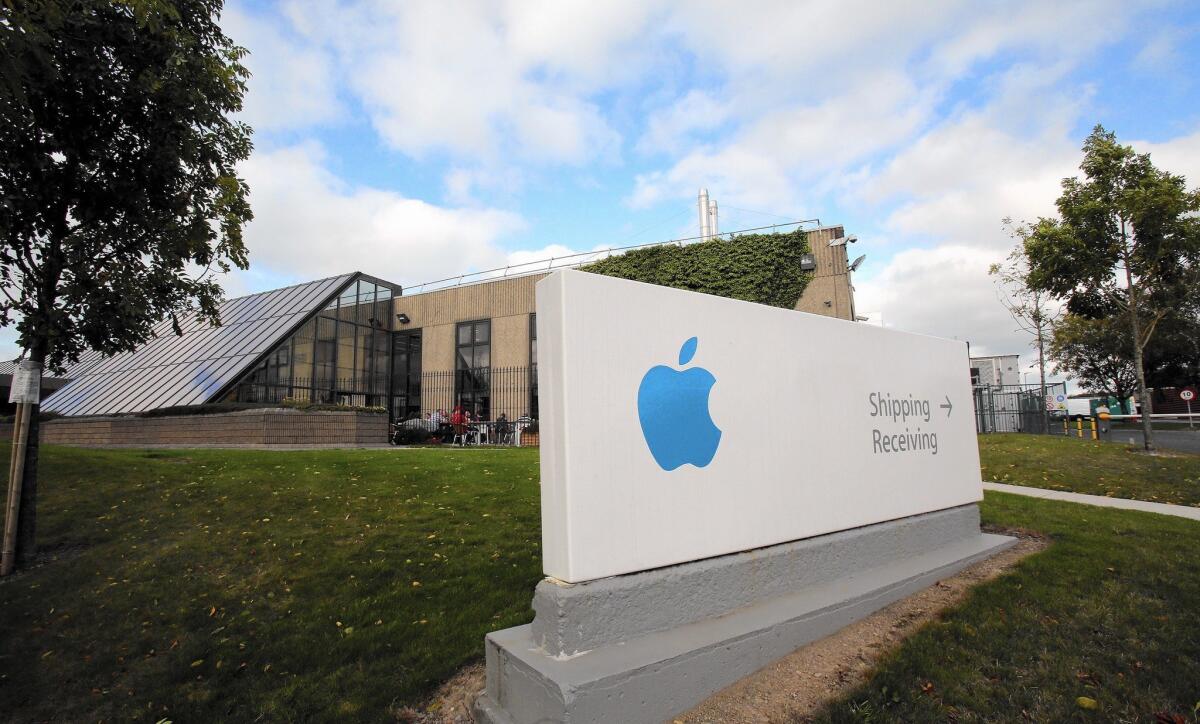Ireland to close corporate tax loophole used by Google and others

- Share via
Reporting from washington — Bowing to pressure from U.S. and European officials, Ireland will phase out a notorious loophole that helps multinational corporations legally dodge billions of dollars in taxes in their homelands.
A tax maneuver known as the Double Irish has allowed major U.S. technology companies such as Google Inc. to funnel income through subsidiaries in Ireland to slash their tax bills at home.
The decision to close that loophole won’t affect Ireland’s low corporate tax rate or other special tax breaks that have lured the likes of tech giants Apple, Facebook, Microsoft and Oracle, all of which have set up Irish subsidiaries to help them shelter foreign profits from U.S. taxes.
The elimination of the Double Irish, though, marks a concession to the U.S. and European nations that have been trying to crack down on corporate efforts to move profits and even their headquarters to countries with low tax rates or special tax breaks.
U.S. companies hold about $2 trillion in cash offshore. Apple said it is holding $138 billion in foreign subsidiaries, much of it in Ireland.
Ever-growing tax deals prompted European Union officials to launch investigations into Ireland’s deal with Apple and two other EU members’ arrangements with major companies. EU leaders said member nations were losing more than $1 trillion a year to individual and corporate tax avoidance.
“All the larger economies are desperate for tax revenue” in the wake of the Great Recession, said Edward Kleinbard, a USC law professor and tax policy expert. The European economy has remained fragile, with several member nations in or nearly in recession again.
“Ireland has offered up this sacrificial lamb,” Kleinbard said, “in the hopes of preserving what’s most important to them in the long term, which is their low corporate tax rate.”
Ireland’s 12.5% rate on corporate income is second only to Switzerland’s 8.5% rate among the world’s most advanced economies, according to the Organization for Economic Cooperation and Development. The U.S. tax rate is the highest at 35%, though many companies don’t pay that much because of tax shelters and loopholes.
On Tuesday, Irish Finance Minister Michael Noonan acknowledged the international pressure and said he was taking action.
“Aggressive tax planning by multinational companies has been criticized by governments across the globe and has damaged the reputation of many countries,” he said. “The so-called Double Irish is one of many such schemes.”
The maneuver involves a company’s setting up two Irish subsidiaries. One collects profits and routes them through a second that has its headquarters for tax purposes in an even lower-tax nation, such as Bermuda, which has no corporate taxes.
Noonan said he was “abolishing the ability of companies to use the Double Irish” by requiring that all companies registered in Ireland pay taxes there as well.
Starting Jan. 1, no companies will be allowed to set up a Double Irish scheme. Ireland also will phase it out through 2020 for companies that already have one, Noonan said.
He said, though, that Ireland intended to develop a new tax break for “knowledge-based capital.”
Sen. Carl Levin (D-Mich), who has been highly critical of companies parking profits overseas, declined to comment on Ireland’s decision.
Louise Phelan, president of the American Chamber of Commerce Ireland, which represents 700 U.S. companies doing business there, said the Irish tax changes will provide certainty to those firms.
“Ensuring Ireland remains a highly attractive location for investment must be a top priority,” Phelan said.
In the U.S., meanwhile, corporate executives have urged the White House and Congress to lower tax rates to keep companies from seeking foreign shelters.
Ireland’s corporate tax rate was 40% in 1994 before the nation began lowering it over the next decade to lure companies. Google, Apple and other U.S. companies began to open subsidiaries there and funneled profits through them.
Last year, a Senate subcommittee investigation found that during a four-year period, Apple shifted $74 billion in income from sales outside North and South America to an Irish subsidiary.
The company paid less than 1% in taxes on those sales under a special agreement it negotiated with Ireland, the Senate investigation said. At the time, Irish officials denied there was any special deal with Apple.
None of Apple’s maneuvers was illegal.
Last June, the European Commission — the EU’s executive body — launched an investigation into whether Ireland provided improper tax breaks to Apple. The commission also is investigating whether the Netherlands provided improper tax breaks to Starbucks and whether Luxembourg did the same with a unit of Fiat Group.
Following Noonan’s announcement Tuesday, Google said it would remain in Ireland.
“As we’ve always said, it’s for governments to decide the law and for companies to comply with it,” the company said. “We’re deeply committed to Ireland and will work to implement these changes as they become law.”
It’s not known how many companies use the Double Irish scheme. Ireland did not release a list, and it’s difficult to determine from corporate filings.
“One hears that ‘countless’ companies use the structure,” said Chris William Sanchirico, co-director of the Center for Tax Law and Policy at the University of Pennsylvania.
The 2013 Senate report did not mention the tactic specifically but said three Apple subsidiaries in Ireland claimed to have no responsibility to pay income taxes to any country.
One of them — Apple Operations International, which reported a total of $30 billion in income from 2009-12 — had not filed a tax return anywhere for five years, the Senate report said.
Apple declined to comment on Ireland’s announcement.
In a securities filing in June, Apple said that the European investigation into Ireland’s tax treatment of its subsidiaries “could increase the company’s taxes in the future.”
For the nine months that ended June 28, Apple said its overall effective tax rate was 26.1%, primarily a result of foreign earnings — “a substantial portion of which was generated by subsidiaries organized in Ireland.”
Apple’s taxes could rise as the Double Irish is phased out, Sanchirico said.
But once Apple has a chance to adapt to the new Irish tax laws and possibly take advantage of the new “knowledge-based capital” tax break, the company’s overall tax rate might not be affected, Sanchirico said.
More to Read
Inside the business of entertainment
The Wide Shot brings you news, analysis and insights on everything from streaming wars to production — and what it all means for the future.
You may occasionally receive promotional content from the Los Angeles Times.












